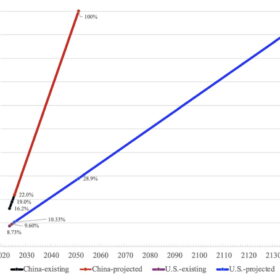U.S. would reach 100% renewable energy by 2148 at recent pace
China is outpacing the U.S. toward 100% renewables for all energy uses and is on track to reach that standard by 2051, versus 2148 for the U.S., projects a study of 150 countries by Stanford professor Mark Jacobson.
ERCOT outperformed on interconnection in 2024 likely due to “connect and manage”
More than 25 GW of large-scale generating projects seeking an interconnection agreement in the ERCOT grid region reached that stage in 2024. Berkeley Lab said ERCOT’s “connect and manage” approach “is likely one reason” for the grid operator’s success.
California water district plans up to 21 GW of solar on land fallowed due to water shortages
A water district serving the western San Joaquin Valley has established a long-term blueprint for developing solar, storage and transmission on lands that “can no longer sustain irrigated agriculture.”
New York program to deploy solar on previously developed sites yields 12 MW in five years
New York State’s Build-Ready program, designed to clear hurdles to solar or storage deployment on previously developed sites, has faced challenges well beyond the expiration of tax credits under the OBBBA tax and spending law, according to a program review.
Colorado utility PSCo must offer flexible interconnection for community solar, storage
Flexible interconnection is one of the most impactful, cost-effective tools for enabling distributed energy resource deployment, said a joint filing by the Solar Energy Industries Association and others.
A solar + storage playbook for New York City Mayor-elect Mamdani
Mayor-elect Mamdani appointed New York Solar Energy Industries Association Executive Director Noah Ginsburg to his mayoral transition team in November. New York SEIA says the “partnership” between the industry and the mayoral administration “presents an historic opportunity.”
New Jersey offers incentives for up to 65 MW of agrivoltaics projects
The Rutgers University rural agrivoltaics program has advised New Jersey regulators on the design of a pilot agrivoltaics program. Projects receiving support will need to track data on agricultural production on fields with and without solar installations.
New York Power Authority renewables plan shows financial challenges for building solar
The levelized cost of building a solar project in New York far exceeds the expected revenue from selling solar power, says a NYPA plan, with project success potentially depending on the sale of renewable energy credits at a satisfactory price.
Rural electric co-ops form engineering group to evaluate smart inverter standards
Smart inverters enable more distributed solar to be added to the grid, and some rural co-ops are evaluating smart inverter standards as more co-op members become prosumers.
Require a gas unit to add 90 MW of batteries to renew its air permit, group says
When a New Jersey gas unit’s air pollution permit is up for renewal, state law allows the public to recommend ways for the unit to reduce its emissions, such as adding batteries. That’s what one group has done.















